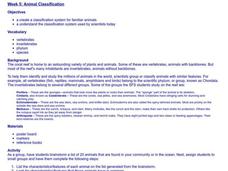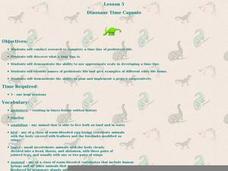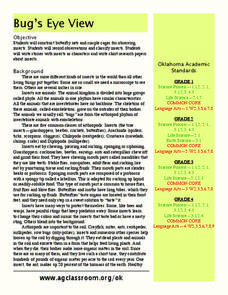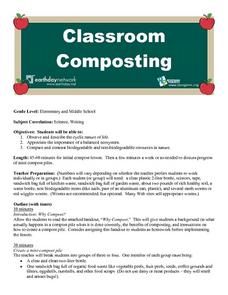Curated OER
Classification of an Invertebrate: Sponge
Young scholars investigate the invertebrate sponge. In this invertebrates lesson plan, students observe the sponge, Grantia, using a dissecting microscope. Young scholars answer questions about their observations and view six other...
NOAA
Invertebrates
Crabs and lobsters ... yum! The 18th installment of a 23-part NOAA Enrichment in Marine sciences and Oceanography (NEMO) program focuses on invertebrate marine life. After the lecture slideshow, learners conduct an activity to sample...
Curated OER
Invertebrate Phyla
Students explore the invertebrate phyla. They discuss the characteristics of the invertebrate Phyla in the Kingdom Animal. Students classify organisms into Phyla based on their characteristics. They distinguish radial symmetry, bilateral...
NOAA
Watch the Screen!
Can a sponge cure cancer? Life science pupils visit the drugstore under the sea in the fifth lesson of six. Working groups research the topic then get hands-on experience by testing the inhibiting effects of several plant extracts on E....
NOAA
Importance of Deep-Sea Ecosystems – Chemists with No Backbones
Marine invertebrates offer us many new options for developing pharmaceutical drugs, such as w-conotoxin MVIIA, which is extracted from the cone snail and is a potent painkiller. The lesson encourages scholars to research various types of...
Curated OER
What Animal Am I?
Students brainstorm different characteristics of invertebrates and investigate invertebrates by conducting Internet research.
Curated OER
The Benthic Drugstore
Students examine active chemicals that are in marine invertebrates and how they act to fight diseases. In this marine lesson students identify three pharmacologically-active chemicals, describe their disease fighting action and infer...
Curated OER
The Benthic Drugstore
Pupils identify at least three pharmacologically- active chemicals derived from marine invertebrates. They describe the disease-fighting action of at least three pharmacologically-active chemicals derived from marine invertebrates.
Curated OER
Animal Classification
Students list characteristics and features of animals found in their community. They then group the animals according to how they are similar and different and create names for each group. They then create a chart of their...
Curated OER
Bug's Eye View
Investigate the life of bugs and how they interact with the environment in this integrated science and language arts lesson. Young scientists construct mini environments in cages in order to make observations. This data forms the basis...
Ocean Explorer
Architects of the Coral Reef
Coral Reefs are the focus of a life science lesson plan. Upper graders look at how coral reefs are formed, how the animals and plants reproduce, and the variety of ways that humans benefit from coral reefs around the world. Groups of...
Curated OER
Dinosaur Time Capsule
Third graders research prehistoric life using educational software. They design a prehistoric life while showing the use of appropriate scale and names for the prehistoric life. They follow an internet link to participate in a virtual...
Curated OER
Home Sweet Home
Students explore marine turtle habitats. Students research one species of marine turtle found in the Gulf of Mexico. They identify plants and animals in the habitat. They create a model or replica using information gathered through their...
Michigan Sea Grant
What's in This Water?
Pupils investigate the biological and chemical characteristics of water to determine where purple loosestrife occurs. They create data sheets to record water quality tests in several locations and work in groups to conduct the water...
Curated OER
Architects of the Coral Reef
Students discuss reproduction in Cnidaria. in this coral reef lesson, students describe five characteristics of Cnidaria and compare and contrast the four classes. They describe the reproduction strategies they use.
Curated OER
Bug's Eye View
Students explore biology by writing fictitious stories in class. In this insect life instructional activity, students identify many different types of insects in the animal kingdom and the classifications they fall into. Students collect...
Curated OER
Diversity And Adaptations Of Organisms
Eighth graders study how and why animals are classified into eight groups in the animal kingdom. They work together to identify organisms. They use the key to determine the phylum for the included problems.
Curated OER
Classroom Composting
Pupils discover the benefits of composting. They identify the steps of decomposition as well. They are read a book and discuss what items decompose.



















